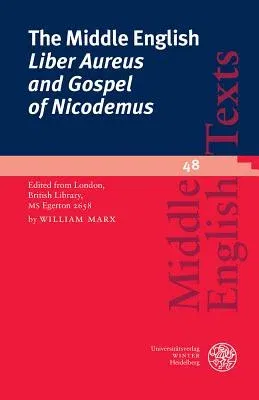The Middle English 'liber Aureus and Gospel of Nicodemus': Edited from London, British Library, MS Egerton 2658Paperback, 1 July 2013

Qty
1
Turbo
Ships in 2 - 3 days
In Stock
Free Delivery
Cash on Delivery
15 Days
Free Returns
Secure Checkout

Part of Series
Middle English Texts
Print Length
143 pages
Language
English
Publisher
Universitatsverlag Winter
Date Published
1 Jul 2013
ISBN-10
3825361756
ISBN-13
9783825361754
Description
Product Details
Book Format:
Paperback
Country of Origin:
US
Date Published:
1 July 2013
Genre:
Medieval (500-1453) Studies
ISBN-10:
3825361756
ISBN-13:
9783825361754
Language:
English
Location:
Heidelberg
Pages:
143
Publisher:
Series: